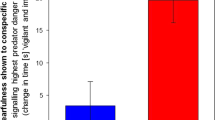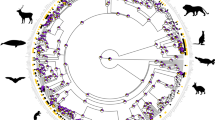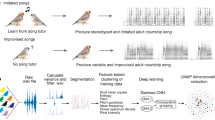Abstract
FEMALE choice of mates based on the expression of characters that correlate with male quality remains a controversial and largely untested idea1. By choosing quality males, females stand to gain resources2, genetic benefits for their offspring3–5, or both. In the house finch (Carpodacus mexicanus), male plumage coloration is a function of dietary intake of carotenoids6,7. Here I present results of field studies that indicate that females prefer to mate with colourful males and that plumage brightness correlates with a male's capactity for parental care and perhaps its genotypic quality. Artificially brightened males paired more quickly and frequently than sham control or lightened males. Among unmanipulated males, plumage coloration was correlated with nest attentiveness and overwinter survival. In addition, there was a positive correlation between the coloration of fathers and sons.
This is a preview of subscription content, access via your institution
Access options
Subscribe to this journal
Receive 51 print issues and online access
$199.00 per year
only $3.90 per issue
Buy this article
- Purchase on Springer Link
- Instant access to full article PDF
Prices may be subject to local taxes which are calculated during checkout
Similar content being viewed by others
References
Bradbury, J. W. & Andersson, M. B. (eds) Sexual Selection: Testing the Alternatives (Wiley, New York, 1987).
Hoelzer, G. A. Anim. Behav. 38, 1067–1078 (1989).
Zahavi, A. J. theor. Biol. 53, 205–214 (1975).
Hamilton, W. D. & Zuk, M. Science 218, 384–387 (1982).
Andersson, M. Evolution 40, 804–816 (1986).
Brush, A. H. & Power, D. M. Auk 93, 725–739 (1976).
Hill, G. E. Auk (in the press).
Gill, D. E. & Lanyon, W. E. Bird-Banding 36, 1–14 (1965).
Hill, G. E. Anim. Behav. 40, 563–572 (1990).
Thompson, W. L. Condor 62, 245–271 (1960).
Michener, H. & Michener, J. R. Condor 33, 12–19 (1931).
Bergtoid, W. H. Auk 30, 40–73 (1913).
Crespi, B. J. & Bookstein, F. L. Evolution 43, 18–29 (1989).
Andersson, M. Biol. J. Linn. Soc. 17, 375–393 (1982).
Dominey, W. J. J. theor. Biol. 101, 495–502 (1983).
Kodric-Brown, A. & Brown, J. H. Am. Nat. 124, 309–323 (1984).
Nur, N. & Hasson, O. J. theor. Biol. 110, 275–297 (1984).
Endler, J. A. Evolution 34, 76–91 (1980).
Endler, J. A. Environ, biol. Fishes 9, 173–190 (1983).
Kodric-Brown, A. Behavl ecol. Sociobiol. 17, 199–205 (1985).
Kodric-Brown, A. Behavl ecol. Sociobiol. 25, 393–401 (1989).
Milinski, M. & Bakker, T. C. M. Nature 344, 330–333 (1990).
Author information
Authors and Affiliations
Rights and permissions
About this article
Cite this article
Hill, G. Plumage coloration is a sexually selected indicator of male quality. Nature 350, 337–339 (1991). https://doi.org/10.1038/350337a0
Received:
Accepted:
Issue Date:
DOI: https://doi.org/10.1038/350337a0
This article is cited by
-
Sex- and age-dependent breeding plumage acquisition in monomorphic species, the Black-headed Gull Chroicocephalus ridibundus
Journal of Ornithology (2024)
-
Relationships between male secondary sexual traits, physiological state and offspring viability in the three-spined stickleback
BMC Ecology and Evolution (2022)
-
Effects of mating age and mate age on lifespan and reproduction in a horned beetle
Behavioral Ecology and Sociobiology (2022)
-
No evidence for potential sexual information from a monochromatic carotenoid trait in a dichromatic woodpecker species
Journal of Ornithology (2022)
-
First observation of a brood patch on a male sunbird (Chalcomitra amethystina)
Journal of Ornithology (2022)
Comments
By submitting a comment you agree to abide by our Terms and Community Guidelines. If you find something abusive or that does not comply with our terms or guidelines please flag it as inappropriate.



